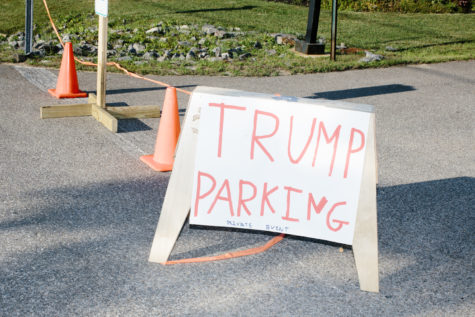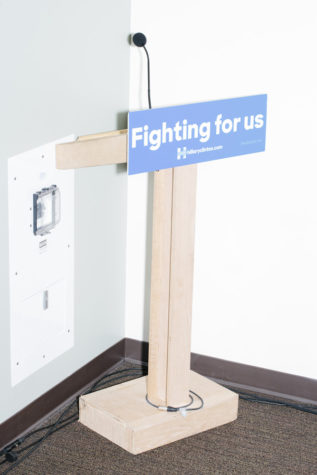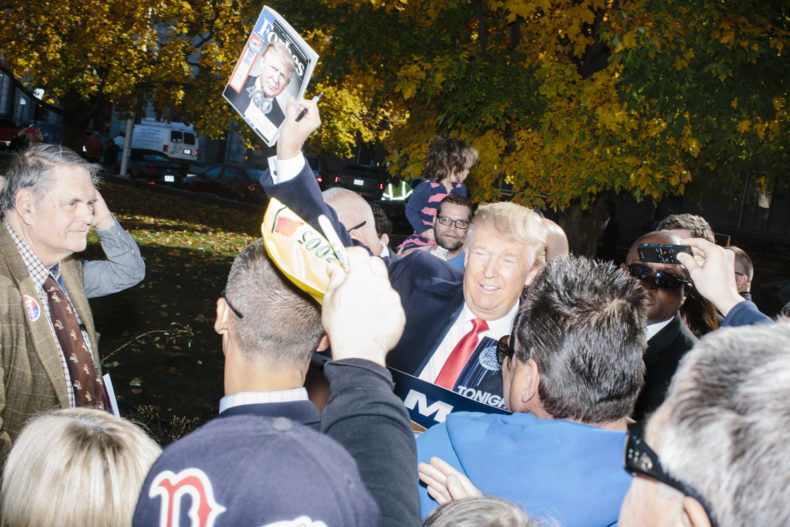 After months of promising, cajoling, negotiating, threatening, inspiring, inciting, confusing, shaming, glorifying, fibbing, flubbing, blustering and exulting, the election is over and we have a winner. Donald J Trump.
After months of promising, cajoling, negotiating, threatening, inspiring, inciting, confusing, shaming, glorifying, fibbing, flubbing, blustering and exulting, the election is over and we have a winner. Donald J Trump.
This was truly an historic election for a lot of reasons that no doubt my colleagues in the political media have, and continue to thrum on about better than I. But there is one element that I as a science writer found especially fascinating. Never in recent history has an election been so charged with emotion and had such an unexpected outcome. And never has an election offered a potential glimpse into the relationship between voting day and health.
In addition to electing Trump, voting day also brought my first book, called Suggestible You, onto the shelves. The book deals with the power of our minds to affect change in our bodies – hypnosis, snake oil, healers, charlatans, geniuses, quacks, witch doctors, and psychologist of every stripe, they’re all in there. I even worked in a couple UFOs and ghosts, just for good measure.
The overarching message is this: our minds and moods have an incredible effect on our bodies and even our sense of what reality is. It’s all about expectation.
 It’s a fascinating topic but after a few years of living in this research, you tend to get a little disconnected from reality. When an MIT pen can improve your test scores and sugar pills can cure impotence, and people under hypnosis can endure excruciating experiences without feeling a thing, reality becomes a little … well … relative.
It’s a fascinating topic but after a few years of living in this research, you tend to get a little disconnected from reality. When an MIT pen can improve your test scores and sugar pills can cure impotence, and people under hypnosis can endure excruciating experiences without feeling a thing, reality becomes a little … well … relative.
In this world, emotion can mean more than fact and belief more than observable reality. Which, if I’m honest, is a pretty good metaphor for election season. Well, it wasn’t long before I got to wondering if a national election – one of the most emotionally charged culture-wide expectation events possible, behind a new Star Wars movie or Beyoncé’s wardrobe choices – might trigger some measurable effect on our bodies, right?
What single event would affect our national health more than an election?
It turns out that plenty has been written about how elections affect our national psyche. Not surprisingly, party members from the winning side tend to see their future more optimistically than those from the loser’s. Fine, that’s the body politic, but I wanted to understand the political bodies themselves.
Here’s the thing though, my research suggests it’s not worthwhile to look at the winners. If there are physiological ripple effects from an election, it would have to be from the losers. During the researching of my book, one of the unmistakable things I found was that when it comes to brain/body interactions, fear is much more powerful than hope.
Take the famous placebo response. Long a bane of the pharmaceutical and medical science world, the placebo effect often registers north of 60 percent in experiments, especially dealing with pain and depression, making it tough to tell whether a drug is working or not. But if you look carefully, you can see that placebo’s alter ego – the nocebo effect – is actually much more powerful than the placebo.
 For instance, placebos often need to be drilled into us through repetition (called conditioning if you are Pavlov or his dog), usually by taking pills numerous times and having them work or else from other sensory triggers. But nocebos (essentially when a treatment causes you more pain/nausea/depression than it should) can arise from just hearing a couple words.
For instance, placebos often need to be drilled into us through repetition (called conditioning if you are Pavlov or his dog), usually by taking pills numerous times and having them work or else from other sensory triggers. But nocebos (essentially when a treatment causes you more pain/nausea/depression than it should) can arise from just hearing a couple words.
This makes sense, right? If I say, “this will make you feel better” it doesn’t have the same kick as if I say, “this is reeeeeally going to hurt.” We are hardwired to respond to fear. So one would expect that after losing such a charged election in such a surprising way, Clinton supporters would be likely to experience more things like chronic pain, psoriasis, even colds than their Trumper countrymen.
So that’s where I dug in for my election research – the science of disappointment, if you will. That’s got to be a thing, right?
“It makes sense – it’s not a wild thing to guess that somebody would have a chronic stress response as a result of disappointment, right?” says Daniela Kaufer, who studies the physiological effects of stress on the body and was one of the few scientists who didn’t laugh in my face when I called. “But disappointment specifically, I don’t know that anyone has looked at.”
The reason, she said, is that it’s just too hard to control. Plenty has been written about the power of prolonged or acute stress on the body but most of it is based on animal models. But if there was a spike in, say, sick days away from work or chronic pain prescriptions, it would be hard to weed out from all the rest of the craziness of our lives. And what would the window be? A week? A month? Four years?
Scientists have enough trouble isolating the health threats of something like poverty, which can cause any number of stress-related maladies over an entire lifetime. Spotting post-election sickness would be a trick indeed. Furthermore, which elections should we isolate? Did Dole supporters get sick in 1996? Kerry voters in 2004? Romney supporters in 2012? What election constitutes sufficient threat to health?
 “There’s going to be so many confounding factors. It would just be very hard to do,” she says. “This is why I stick with rats, you see.”
“There’s going to be so many confounding factors. It would just be very hard to do,” she says. “This is why I stick with rats, you see.”
And lab rats don’t have elections. The literature wasn’t much help either. When I typed “psychology” and “disappointment” into PubMed I got a stream of papers about erectile dysfunction, followed by several hilarious moments of confusion on my part. But nothing on election dysfunction.
“I understand your thinking and it makes sense,” says John Swatzberg, an expert in wellness at the Berkeley School of Health. “[But] you’d have to find somebody who’s really studied a stressful event that has a finite point where it ends.”
In other words, a natural disaster. He quotes an old axiom in psychology: The road to anxiety disorders and depression is paved with worrying about things you have no control over. It seems that the important thing in triggering physiological stress is to take away control. In the course of researching my book, I heard again and again that there really isn’t much difference between anxiety or depression and chronic pain. One often follows the other and it’s rarely clear which is true problem.
 The negative “nocebo” suggestions that I came across in my research that were most powerful – even lethal in some cases – were the ones where people felt totally powerless to prevent, such as the people who become temporarily paralyzed when waking up or when a powerful witch doctor had put a curse on them.
The negative “nocebo” suggestions that I came across in my research that were most powerful – even lethal in some cases – were the ones where people felt totally powerless to prevent, such as the people who become temporarily paralyzed when waking up or when a powerful witch doctor had put a curse on them.
But Swatzberg points out that in his own life there is a simple fix to potential post-election stress. Vote. By voting, no matter who wins, you have taken control of the situation and done what you could to shape your own future.
For one last perspective, I wrote to the legendary Stanford stress expert, Robert Sapolsky. He said the best place to see an effect from election shock would be on the suicide hotlines. A chilling thought.
So there it is. If you voted for Trump, you might get a little boost – a spring in your step – but no super powers. But if you voted for Clinton – and if you were really invested in this election – now might be a good time to take a little break. Get that massage you’ve always wanted. Take an extra bath.
Stay healthy, everybody.
Photo Credit: With permission from the incredibly talented Scott Brauer
Reporting for this project supported in part by the Pulitzer Center on Crisis Reporting.
Special thanks to my wife – Liz Vance. Happy Birthday!

3 thoughts on “Fear and Loathing in Elections”
Comments are closed.